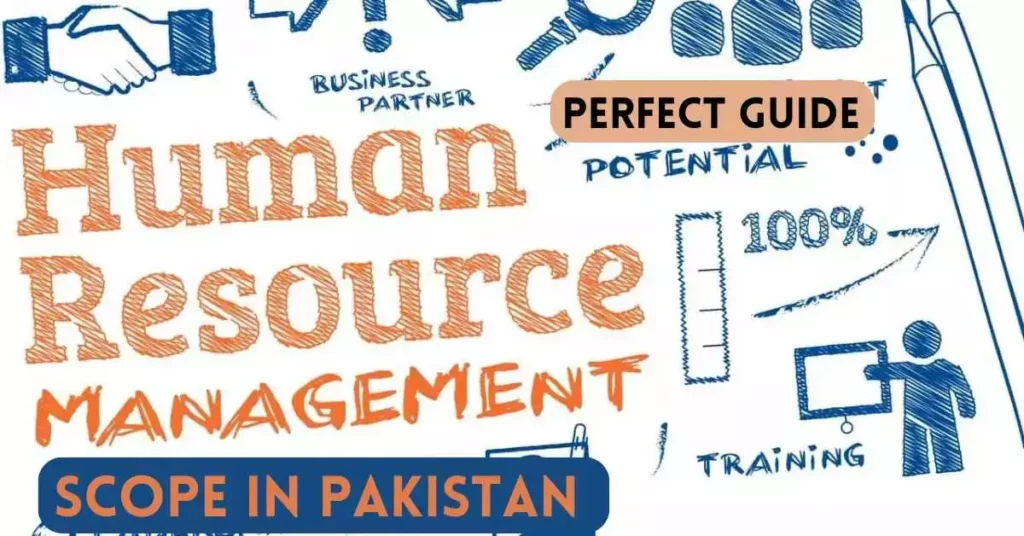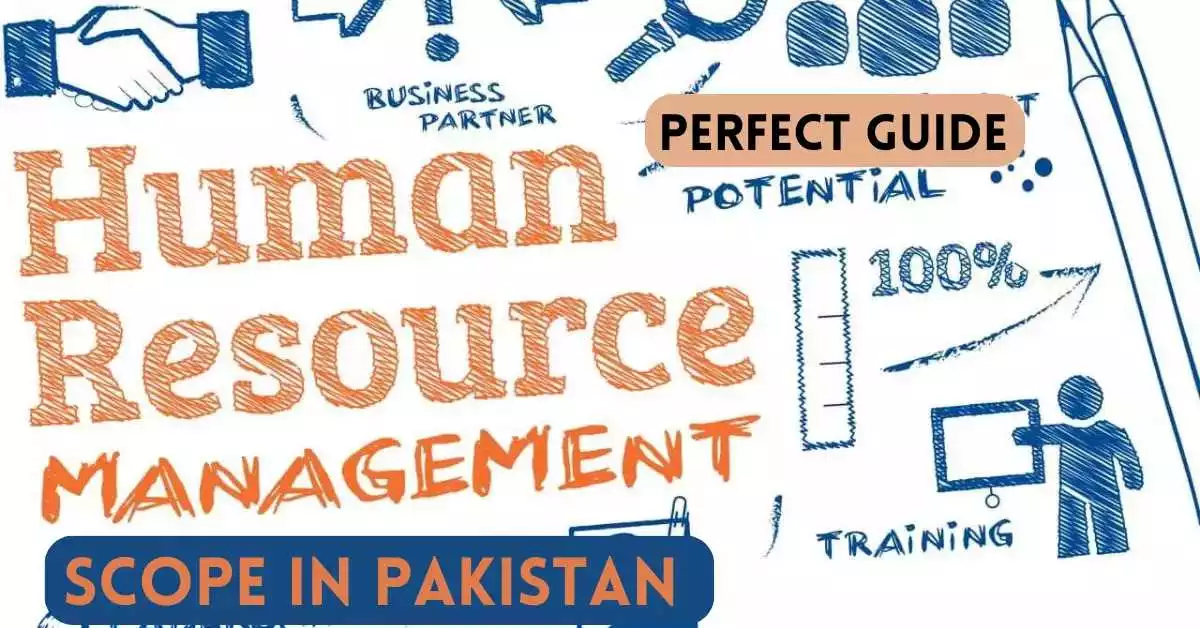Human Resource Management (HRM) in Pakistan opens doors to a dynamic and rewarding career landscape. From a range of educational paths to exciting career opportunities, the potential within this field is vast.

This guide explores the educational routes, promising careers, and the latest trends in HRM in Pakistan. Dive in to uncover the potential of HRM and the array of roles, growth opportunities, and strategic positions this sector has to offer.
Understanding HRM Scope in Pakistan
In Pakistan, Human Resource Management (HRM) takes on a strategic approach to managing human talent within organizations. This goes beyond the administrative; it’s about aligning workforce goals with broader organizational objectives.
Core HRM functions include recruitment, training, performance management, and employee relations, which collectively support and advance the company’s mission.
Career Prospects and Job Market
The job market for HRM professionals in Pakistan is robust and continues to grow. As talent management becomes more crucial to businesses, HR roles have moved into strategic areas within organizations.
Opportunities span various sectors like manufacturing, IT, education, and banking, with roles such as HR officers, consultants, directors, and talent managers, offering diverse career paths.
For HR professionals considering further career growth, pursuing an MBA in Pakistan can open additional avenues in management and strategic roles.
Salaries and Benefits
Salary levels in HRM vary by role, experience, and education. Entry-level salaries start modestly but come with room for growth.
Experienced HR professionals often enjoy competitive salaries, sometimes with bonuses and perks, like healthcare, retirement plans, and performance-based incentives. As HR roles continue evolving, benefits packages have become more attractive.
The breadth of HRM in Pakistan covers strategic roles, an array of career paths, and competitive compensation, marking it as an engaging and rewarding field.
Career Paths and Specializations in HRM
Specializations within HRM
HRM in Pakistan offers specializations that address different areas of people management, including talent acquisition, employee relations, training and development, compensation and benefits, HR analytics, and organizational development.
Each area requires unique skills, allowing professionals to align their careers with personal strengths and interests.
Certifications like ACCA offer specialized knowledge that complements HR functions, particularly in areas like compensation and benefits. Learn more about the scope of ACCA in Pakistan and how it can enhance your HR career.
Job Roles and Responsibilities
Within HRM, roles come with varied responsibilities. HR Officers manage recruitment, onboarding, and employee records, while HR Directors focus on strategy and policy.
HR Consultants lend expertise to different organizations, Talent Managers concentrate on developing employees’ potential, and Learning & Development Managers are dedicated to enhancing employees’ skill sets. Together, these roles ensure the smooth functioning of a company’s workforce.
Exploring these specializations and roles gives a panoramic view of the paths available in HRM, from strategic oversight to specific HR functions that enhance workplace efficiency.
Essential Skills and Requirements
Necessary Skills for HR Managers
Successful HR managers blend soft skills, like communication, interpersonal skills, empathy, and leadership, with technical knowledge. They need to be familiar with labor laws, HR software, data analysis, and strategic planning.
Adaptability, decision-making, and problem-solving are essential to navigate the HR field’s evolving demands.
Qualifications and Eligibility Criteria
Starting a career in HRM generally requires a bachelor’s degree in HR or a related area. However, career prospects improve with certifications, such as SHRM (Society for Human Resource Management) or HRMP (Human Resource Management Professional).
Although some positions prefer a postgraduate degree, experience and demonstrated skill also carry significant weight.
Grasping these essential skills and qualifications not only prepares you for a successful career but underscores the importance of continuous learning and growth in this fast-evolving field.
HRM Education in Pakistan
Top Universities Offering HRM Programs
Many reputable universities in Pakistan offer extensive HRM programs. Institutions like Allama Iqbal Open University, the University of Karachi, and the Virtual University of Pakistan offer HRM degrees with a focus on both theory and practical skills.
Their curricula often include recruitment, organizational behavior, HR strategy, labor laws, and employee development.
Admission Criteria and Core Courses
Admission criteria usually consist of academic qualifications, entrance exams, and interviews. Core courses span essential topics, from HR planning and employee relations to compensation management and strategic HRM, forming a foundation for successful HR practice.
With high-quality HRM programs at leading Pakistani universities, aspiring HR professionals are well-equipped for a thriving career. Understanding admission requirements and course offerings is key to selecting the right program for your goals.
Future Trends and Job Opportunities

Trends in HRM in Pakistan
HRM in Pakistan is adapting rapidly to tech advancements and evolving work dynamics. Key trends include integrating HR technology, focusing on employee experience, facilitating remote work, championing diversity, and making data-driven HR decisions. Keeping up with these trends is essential for professionals looking to stay competitive.
As the HR field evolves, it’s essential to understand the trends in business and economics that shape strategic HR planning and decision-making.
Future Job Prospects and Growth
The future of HRM in Pakistan is bright, with a rising demand for skilled HR professionals. As companies emphasize talent management, strategic HR roles will increase, creating opportunities in areas like HR analytics, change management, and HR transformation.
Anticipating future trends and opportunities in HRM empowers professionals to stay agile, enhancing their ability to thrive in a shifting landscape.
Job Sectors and HRM Opportunities
HR Careers in Various Sectors
HRM professionals in Pakistan have diverse roles across industries. In manufacturing, they manage workforce needs, while in IT, they focus on recruiting skilled tech talent. Education relies on HR for managing faculty and strategic planning, and the banking sector requires HR experts for compliance and talent retention.
Specific Opportunities in Different Industries
Each industry presents unique HR opportunities. For instance, HR roles in manufacturing often include labor relations, in IT, they focus on innovation and talent acquisition, in education, the focus is on learning and development, while in banking, they prioritize compliance and retention.
By understanding the unique demands of each sector, HR professionals can position themselves strategically to meet industry needs, broadening their career horizons.
Functionality and Practices in HRM
Key Functions in HRM
- Planning: Anticipating workforce needs and aligning them with company goals.
- Recruitment & Selection: Attracting and hiring qualified talent.
- Training & Development: Building employee skills and expertise.
- Performance Appraisal: Evaluating performance to drive improvements.
- Compensation Planning: Creating fair and attractive compensation packages.
- Employee Relations: Fostering healthy employer-employee relationships.
- Health & Safety: Ensuring a safe, compliant work environment.
- Industrial Relations: Managing relations with labor unions or associations.
HRM Practices and Operations
HR professionals are responsible for strategizing these functions. They handle recruitment, conduct performance appraisals, develop targeted training, and enforce labor laws. Through proactive HR policies, they foster a positive culture that boosts employee morale and productivity.
Understanding HR’s role in these areas equips professionals to optimize the workforce and align HR efforts with organizational goals, creating a thriving work environment in Pakistan.
Challenges and Considerations
Obstacles in HRM Careers
- Changing Work Dynamics: Balancing remote work, flexible schedules, and other emerging models.
- Talent Retention: Keeping skilled employees engaged amid competition.
- Compliance: Navigating complex labor laws.
- Technology: Integrating HR tech while maintaining data privacy.
- Diversity: Implementing inclusion initiatives effectively.
Working Environment and Challenges
HR managers often operate in fast-paced settings. Balancing organizational and employee needs, resolving conflicts, and maintaining positive morale are demanding yet vital tasks. This role requires a strategic mind and strong interpersonal skills.
By recognizing these challenges, HR professionals can proactively tackle issues and foster a growth-oriented environment in Pakistani workplaces.
Conclusion:
In the rich field of Human Resource Management in Pakistan, this guide has provided a detailed look at educational paths, career possibilities, and industry trends. Whether it’s understanding HRM education or the wide range of specializations and sectors, the scope of HRM continues to expand.
With tech advancements and changing work dynamics reshaping HR, adaptability is key. This overview guides aspiring HR professionals towards a fulfilling career where they can impact organizational growth and workforce culture across Pakistan.
FAQs:
Is HRM a good career?
Absolutely. HRM is ideal for those passionate about people and organizational development, offering fulfilling opportunities.
Is HR in high demand?
Yes, as HR professionals play a key role in managing and developing talent across industries.
What is the HR Executive salary in Pakistan?
HR Executives in Pakistan typically earn between PKR 30,000 and PKR 100,000 per month, depending on experience and the organization.
Which country is best for HR jobs?
Countries like the USA, UK, Canada, and Australia have extensive HR opportunities in their strong business sectors.
What is the head of human resources called?
Common titles for the head of HR include HR Director, HR Manager, or Chief Human Resources Officer (CHRO).

